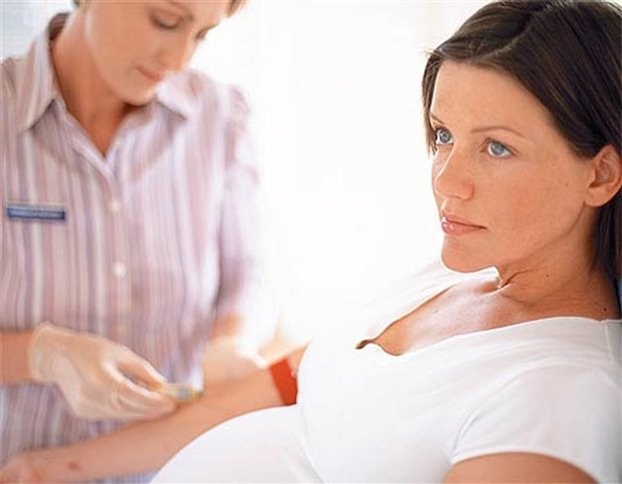Blood tests
During pregnancy the expectant mother will have to give blood several times. For the first time, the doctor will prescribe the direction to the laboratory in setting women on the account. Take blood from the finger and from a vein. In the first case is a clinical analysis to test the level of hemoglobin, leukocytes, platelets and ESR, and blood sugar. The second material required to determine blood group and RH factor, HIV testing, syphilis (blood on RW) and carriers of hepatitis viruses, as well as the presence of pathogens of ToRCH complex (toxoplasmosis, rubella, cytomegalovirus and herpes). Also, be done blood chemistry to check kidney and liver of the expectant mother, to assess lipid, carbohydrate and protein metabolism, and to determine the level of serum iron.
If it turns out that the woman 1 blood group or negative RH factor, the doctor will suggest to take the same analysis and the father of the child.
Common blood test have to be repeated at 18 and 30 weeks, and in the presence of deviations as required. So, with a low level of hemoglobin or increase in white blood cells of a pregnant woman will have to undergo treatment, after which to hand over the control and analysis to ensure that all indicators came back to normal.
Biochemical analysis of blood, testing for HIV, hepatitis and syphilis will have to repeat the period of 30 weeks. A recent study (RW) will be held for the third time − 3-4 weeks before the expected birth.
In the period of 16-20 weeks will be conducted a screening blood test for AFP and HCG. This analysis allows us to calculate the probability of having a child with genetic abnormalities. If it is high, the woman will be asked to pass an additional examination.
Urinalysis
The direction of the urinalysis, the doctor will give the woman at each visit. Research is needed in order to assess the renal function of the expectant mother, and to exclude a urinary tract infection that can occur or worsen during pregnancy. If there are deviations in the overall analysis may be assigned additional research − the analysis of urine on Nechiporenko. If it will be far from ideal, the woman will have to undergo treatment in severe cases in the hospital.
In order to avoid errors and inaccuracies in the test results it is desirable to pass urine in a sterile container.
Other tests
Also during pregnancy a woman will have to take a swab from the vagina. The study is carried out at least twice: at statement on the account and before going on maternity leave (the period of 28-30 weeks). The analysis shows the presence or absence of inflammatory processes in the vagina, and sexually transmitted diseases. If there are deviations in the analysis, the woman will need to undergo treatment and to retake PAP smear.


